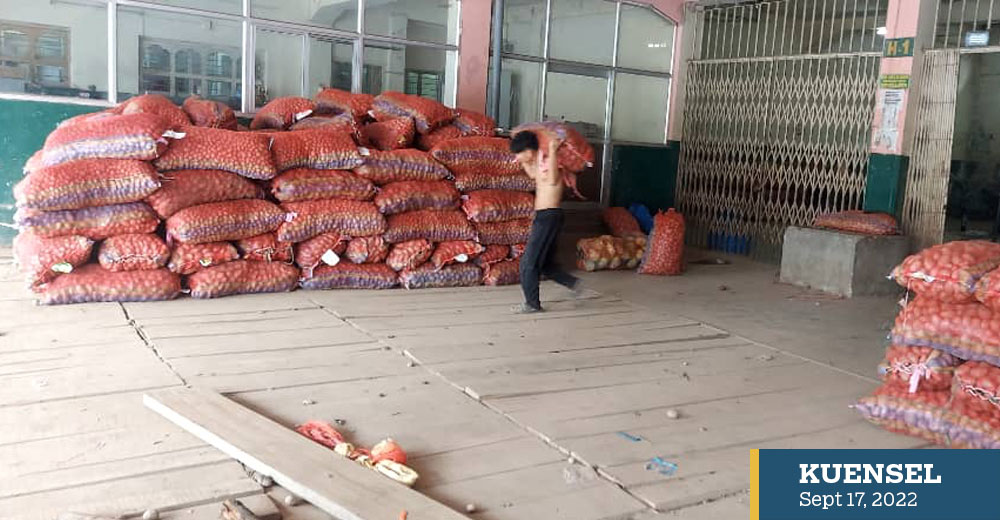Rajesh Rai | Phuentsholing
Despite the initial hiccup where some local traders in Jaigaon threatened to not buy Bhutanese potatoes, importers across the border have agreed to make payment for import through the formal banking channels.
This also includes other cash crops and vegetables for which there was no channelised payment.
Food Corporation of Bhutan Limited (FCBL) sent its first consignment on September 13.
The Royal Monetary Authority (RMA) on September 3 directed exporters to maintain trade receipts with the importers across the border in INR through banking channels – as per Section 24 of the Foreign Exchange Rules and Regulations (FERR) 2020. RMA notified that exporters exporting to India must obtain a Bank Export Registration (BER) before processing the export declaration at the customs point of exit starting September 5.
This announcement was not received well by some vendors in Jaigaon. About 23 such traders syndicated to not buy potatoes and other cash crops if payments had to be made through banks. In a hand-written statement, they signed and agreed not to import potatoes and cash crops starting from September 5. Some of them were traders who were listed with the FCBL.
However, in a U-turn decision, they have welcomed the decision.
FCBL’s director for the department of corporate business, Dorji Tashi said they exported 35 metric tonnes (MT) of potatoes on September 13.
“Although some people tried to form a syndicate against the channelised payment, there were genuine people who were okay with the change,” he said.
While FCBL has their own (listed) traders in Jaigaon, a few private exporters in Phuentsholing, although supportive of the new payment mode, are skeptical about the time it may take for their importers in making the payment.
One exporter said, “The rule mentions six months’ time for importers across the border to make the payment. But what if they fail to do so due to some circumstances?” He said it would be better if there was an arrangement where importers could make 50 percent advance payment from the banks before potatoes or other cash crops are sent.
“Otherwise, the importers will take the produce and exporters in Phuentsholing will have to bear all the risks.”
Dorji Tashi said the trade is based on a mutual trust between suppliers and buyers.
“Some have MoUs as well,” he said. “Six months is the maximum time but we have told them to make the payment within a week.”
With the formal payment mode in place, there will be many positive changes to look for. At present, sources say Bhutanese traders export potatoes and other cash crops to vendors in Jaigaon, who then sell the produce to third parties across India.
Although Jaigaon parties are paid in INR, they pay Bhutanese in Ngultrum through informal means and evade tax. This will be done away with now.
Further, while Bhutanese exporters receive Ngultrums, the INR remains in Jaigaon. The same untaxed INR is then used for illegal INR-Ngultrum buying and selling, which has depreciated the Ngultrum value. Today, INR is still sold illegally in Jaigaon at a 4 to 5 percent commission. INR 100 is sold for Nu 104 or 105.
The channelised payment system will also increase the government’s INR reserves.


